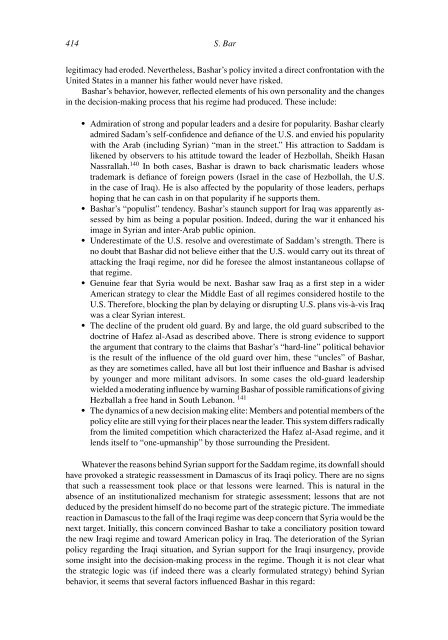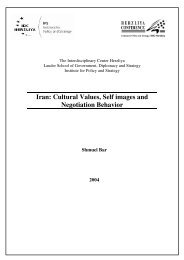Bashar’s <strong>Syria</strong> 413Bashar’s support of Iraq included: pro-Iraqi rhetoric such as his referral to Iraq as<strong>Syria</strong>’s “strategic depth”; political support for Iraq in the United Nations Security Council(<strong>Syria</strong>n support for UNSC resolution 1441 of November 2002 notwithst<strong>and</strong>ing, as it wasviewed by Damascus as a means to tie the h<strong>and</strong>s of the U.S.); economic support throughillicit trade, <strong>and</strong> opening of the oil pipeline; 137 <strong>and</strong> military support through smuggling ofmilitary components from <strong>Syria</strong> to Iraq. <strong>The</strong> regime, <strong>and</strong> Bashar himself, did not stop at pro-Iraqi statements, but escalated into direct anti-American rhetoric as well. Bashar accusedthe U.S. of a policy directed toward “gaining control over Iraqi oil <strong>and</strong> redrawing the mapof the region in keeping with <strong>its</strong> worldview,” <strong>and</strong> warned the Arabs that the American threatwas greater than the Sykes-Picot agreement, the Balfour declaration, <strong>and</strong> the establishmentof the State of Israel, <strong>and</strong> that U.S. friendship is “more fatal than <strong>its</strong> hostility.” 138 Later,during the American offensive, senior spokesmen for the <strong>Syria</strong>n regime declared <strong>Syria</strong>’stotal support for Iraq <strong>and</strong> even went as far as to compare George W. Bush to Adolf Hitler. 139Developments in Iraq in the wake of the fall of the Saddam regime have presentedBashar with a number of strategic challenges: First <strong>and</strong> foremost, the fall of the Iraqi Ba’th regime <strong>and</strong> the potential for democratizationis seen from Damascus as clarifying U.S. intentions towards the <strong>Syria</strong>nBa’th regime. Moreover, the American occupation of Iraq has made the U.S. <strong>Syria</strong>’s“neighbor.” <strong>The</strong> economic consequences of the halt of smuggled Iraqi oil to <strong>Syria</strong> <strong>and</strong> sanctionviolatingtrade between the two countries have undermined the <strong>Syria</strong>n economy. <strong>The</strong>immediate damage to the <strong>Syria</strong>n economy is assessed at billions of dollars a year(oil smuggling <strong>and</strong> illicit trade alone was assessed in 2002 as amounting to about $3billion). <strong>Syria</strong>n support, either active or tacit, for insurgent elements in Iraq has alienated theU.S. without delivering any real advantages to <strong>Syria</strong>. While <strong>Syria</strong> is attempting to reach out to the Shi’ite-Kurdish regime, it fears that thesuccess of the Kurds in Iraq may incite irredentism by <strong>Syria</strong>n Kurds.Bashar’s relations with the Saddam regime at a time that the Iraqi regime was undersiege <strong>and</strong> anticipating an American attack have been attributed to Bashar’s political naiveté,inability to read the strategic map, <strong>and</strong> adulation of self-confident leaders. For comparison,one may look at the pragmatic decision of the elder Asad during the first Gulf War (1991)to support the Coalition <strong>and</strong> even send forces. This was due to his animosity toward theIraqi regime his realistic analysis that the U.S.-led coalition would succeed in ousting Iraqfrom Kuwait, <strong>and</strong> his expectation that collaboration would bestow <strong>Syria</strong> with U.S. supportboth in Lebanon <strong>and</strong> in the Israeli–<strong>Syria</strong>n peace process. At the same time, while Saddam’spopularity was at <strong>its</strong> peak during the first Gulf War (much more than in the second round),Hafez al-Asad remained oblivious to populist considerations, knowing that public opinionwas fickle <strong>and</strong> that boosting the popularity of Saddam in <strong>Syria</strong> would limit his politicalroom for maneuver. <strong>The</strong> elder Asad had always remained prudent in his relations with theUnited States <strong>and</strong> rarely permitted the heights of anti-Americanism that Bashar allowed.Presumably, most of the considerations that brought Hafez al-Asad to cooperate withthe Coalition in the first Iraqi war should have been valid for Bashar. This is particularly truein the light of the fact that many of the factors that played a role in Hafez al-Asad’s decisionhave since become more prominent, the status of the U.S. as the world’s sole superpowerhad been enhanced, the events of 9/11 <strong>and</strong> the American invasion of Afghanistan had shownthe extent of the resolve of the present U.S. President, <strong>and</strong> Saddam’s Arab <strong>and</strong> international
414 S. <strong>Bar</strong>legitimacy had eroded. Nevertheless, Bashar’s policy invited a direct confrontation with theUnited States in a manner his father would never have risked.Bashar’s behavior, however, reflected elements of his own personality <strong>and</strong> the changesin the decision-making process that his regime had produced. <strong>The</strong>se include: Admiration of strong <strong>and</strong> popular leaders <strong>and</strong> a desire for popularity. Bashar clearlyadmired Sadam’s self-confidence <strong>and</strong> defiance of the U.S. <strong>and</strong> envied his popularitywith the Arab (including <strong>Syria</strong>n) “man in the street.” His attraction to Saddam islikened by observers to his attitude toward the leader of Hezbollah, Sheikh HasanNassrallah. 140 In both cases, Bashar is drawn to back charismatic leaders whosetrademark is defiance of foreign powers (Israel in the case of Hezbollah, the U.S.in the case of Iraq). He is also affected by the popularity of those leaders, perhapshoping that he can cash in on that popularity if he supports them. Bashar’s “populist” tendency. Bashar’s staunch support for Iraq was apparently assessedby him as being a popular position. Indeed, during the war it enhanced hisimage in <strong>Syria</strong>n <strong>and</strong> inter-Arab public opinion. Underestimate of the U.S. resolve <strong>and</strong> overestimate of Saddam’s strength. <strong>The</strong>re isno doubt that Bashar did not believe either that the U.S. would carry out <strong>its</strong> threat ofattacking the Iraqi regime, nor did he foresee the almost instantaneous collapse ofthat regime. Genuine fear that <strong>Syria</strong> would be next. Bashar saw Iraq as a first step in a widerAmerican strategy to clear the Middle East of all regimes considered hostile to theU.S. <strong>The</strong>refore, blocking the plan by delaying or disrupting U.S. plans vis-à-vis Iraqwas a clear <strong>Syria</strong>n interest. <strong>The</strong> decline of the prudent old guard. By <strong>and</strong> large, the old guard subscribed to thedoctrine of Hafez al-Asad as described above. <strong>The</strong>re is strong evidence to supportthe argument that contrary to the claims that Bashar’s “hard-line” political behavioris the result of the influence of the old guard over him, these “uncles” of Bashar,as they are sometimes called, have all but lost their influence <strong>and</strong> Bashar is advisedby younger <strong>and</strong> more militant advisors. In some cases the old-guard leadershipwielded a moderating influence by warning Bashar of possible ramifications of givingHezballah a free h<strong>and</strong> in South Lebanon. 141 <strong>The</strong> dynamics of a new decision making elite: Members <strong>and</strong> potential members of thepolicy elite are still vying for their places near the leader. This system differs radicallyfrom the limited competition which characterized the Hafez al-Asad regime, <strong>and</strong> itlends <strong>its</strong>elf to “one-upmanship” by those surrounding the President.Whatever the reasons behind <strong>Syria</strong>n support for the Saddam regime, <strong>its</strong> downfall shouldhave provoked a strategic reassessment in Damascus of <strong>its</strong> Iraqi policy. <strong>The</strong>re are no signsthat such a reassessment took place or that lessons were learned. This is natural in theabsence of an institutionalized mechanism for strategic assessment; lessons that are notdeduced by the president himself do no become part of the strategic picture. <strong>The</strong> immediatereaction in Damascus to the fall of the Iraqi regime was deep concern that <strong>Syria</strong> would be thenext target. Initially, this concern convinced Bashar to take a conciliatory position towardthe new Iraqi regime <strong>and</strong> toward American policy in Iraq. <strong>The</strong> deterioration of the <strong>Syria</strong>npolicy regarding the Iraqi situation, <strong>and</strong> <strong>Syria</strong>n support for the Iraqi insurgency, providesome insight into the decision-making process in the regime. Though it is not clear whatthe strategic logic was (if indeed there was a clearly formulated strategy) behind <strong>Syria</strong>nbehavior, it seems that several factors influenced Bashar in this regard:
- Page 4 and 5:
Bashar’s Syria 355of political im
- Page 8 and 9:
Bashar’s Syria 359a-Zur province
- Page 11: 362 S. Barof Lebanon, with which Sy
- Page 17 and 18: 368 S. Barnaturally come with the s
- Page 19 and 20: 370 S. BarSimilar behavior on the p
- Page 21 and 22: 372 S. Bardemocracy” must be foun
- Page 23 and 24: 374 S. Barcultural, political and m
- Page 25 and 26: 376 S. Barexcept for those with fam
- Page 27 and 28: 378 S. Barthe provisions for nonpro
- Page 29 and 30: 380 S. Bar The ups and downs in rel
- Page 31 and 32: 382 S. Barfamily is also linked by
- Page 33 and 34: 384 S. Bar2. The “second generati
- Page 35 and 36: 386 S. BarThe reformist trend withi
- Page 37 and 38: 388 S. Barwould allow the younger g
- Page 39 and 40: 390 S. BarFigure 3. Heads of the Sy
- Page 41 and 42: 392 S. Bar Disruption of the “hie
- Page 43 and 44: 394 S. Bar(Majlis Milli), composed
- Page 45 and 46: 396 S. Bar Other prominent Syrians
- Page 47 and 48: 398 S. BarSyrian civil society—su
- Page 49 and 50: 400 S. BarMany of the Muslim Brothe
- Page 51 and 52: 402 S. BarThese elements find reson
- Page 53 and 54: 404 S. BarIran’s proxy, Hezbollah
- Page 55 and 56: 406 S. BarWest—and specifically t
- Page 57 and 58: 408 S. BarBashar is well aware that
- Page 59 and 60: 410 S. BarBashar did not read these
- Page 61: 412 S. Bartoken withdrawal while ma
- Page 65 and 66: 416 S. Barin the wake of the al-Har
- Page 67 and 68: 418 S. BarIt was Russia, however, t
- Page 69 and 70: 420 S. Baror so, with competitive p
- Page 71 and 72: 422 S. Bar10. According to the well
- Page 73 and 74: 424 S. Bar44. See Flynt Everett, In
- Page 75 and 76: 426 S. Barinternet news site, all4s
- Page 77 and 78: 428 S. Bar100. As one Sunni Syrian
- Page 79 and 80: 430 S. Bar125. Radio Damascus, 21 O
- Page 81 and 82: 432 S. BarBengio, Ofra and Gabriel
- Page 83 and 84: 434 S. BarNews agencies and Newspap
- Page 85 and 86: Regional Command;Central CommitteeR
- Page 87 and 88: Main Figures in the Syrian Ba’th
- Page 89 and 90: Main Figures in the Syrian Ba’th
- Page 91 and 92: Main Figures in the Syrian Ba’th
- Page 93 and 94: Main Figures in the Syrian Ba’th
















